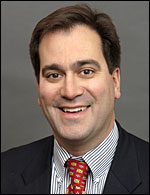Apr 28 2009
Northwestern University researcher Chad A. Mirkin, the world's top-cited researcher in nanomedicine and one of the most widely cited chemists, has been named to the President's Council of Advisors on Science and Technology (PCAST).
 Chad Mirkin
Chad Mirkin
President Barack Obama announced the names of the 20 members in a speech at the National Academy of Sciences today (April 27).
“This council represents leaders from many scientific disciplines who will bring a diversity of experience and views,” said President Obama. “I will charge PCAST with advising me about national strategies to nurture and sustain a culture of scientific innovation.”
PCAST is an advisory group of the nation's leading scientists and engineers who advise the president and vice president and formulate policy in many areas where understanding of science, technology and innovation is key to strengthening the U.S. economy and forming policy that works for the American people.
Mirkin is the George B. Rathmann Professor of Chemistry in the Weinberg College of Arts and Sciences and professor of medicine, chemical and biological engineering, biomedical engineering and materials science and engineering. He also is director of the International Institute for Nanotechnology at Northwestern.
Mirkin is an expert in the research and application of nanotechnology, including nanoscale manufacturing and applications to medicine. He is renowned for his invention and development of biological and chemical diagnostic systems based upon nanomaterials and is the inventor and chief developer of Dip-Pen Nanolithography, a groundbreaking nanoscale fabrication and analytical tool. He is the founder of Nanosphere and NanoInk, two Chicago-based companies.
A member of the National Academy of Engineering, Mirkin has been recognized with more than 50 national and international awards for his advances. Last year he was selected by the U.S. Department of Defense as an inaugural fellow in the department's new National Security Science and Engineering Faculty Fellows (NSSEFF) Program. Mirkin also received, in 2004, the Director's Pioneer Award from the National Institutes of Health, an honor on par with the NSSEFF Program. He is the only person to receive both awards.